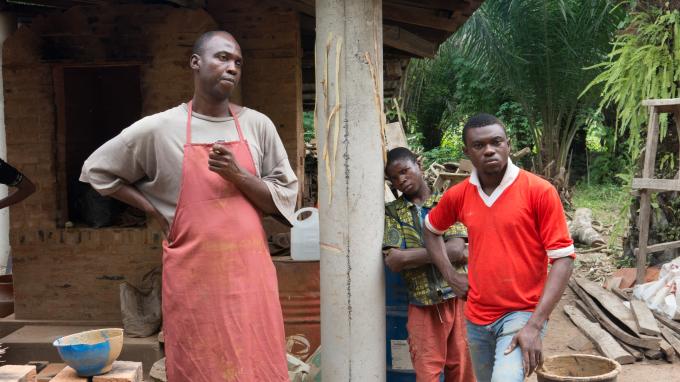Rolinson documents fight against waterborne diseases in Africa
 The Point
The Point
Winter 2014
Potters Waters Action Group (PWAG) is an association of individuals and organizations united in the war against waterborne disease. Since 1999, members of the group have been promoting and improving the silver enhanced, ceramic water filter that can be produced almost anywhere in the world using locally obtained materials.
Based in the POT SHOP at the Braddock Carnegie Library since 2004, the PWAG and its affiliates have assisted in the establishment of water filter production and distribution facilities in Honduras, Haiti, Iraq, Sudan and the Dominican Republic.
My role in PWAG is to document the history and development of the water filter; beginning with its champion, sociologist/potter Ron Rivera, and continuing through our current project. Rivera died five years ago from malaria contracted while attempting to set up a production facility in Nigeria. Last May my mentor, retired Slippery Rock University Professor Richard Wukich, visited the same site to carry out Rivera's vision of pure water.
The pottery is located in a grove of palm trees outside the village of Atamora. The master potter, Ibukunoluwa Ayoola, known as IBK, is an anomaly in the Nigerian pottery tradition as the work has traditionally been conducted by women. He attended college training as an accountant.
After a few years, unable to accept the tedium of a desk job, he and his wife moved to his grandmother's village and took up farming and pottery. IBK learned his skills from various sources and eventually attracted young people who wanted to work in the clay arts.
Currently, he has a number of apprentices living in the village and learning to become potters. The filter production facility will add another dimension to the pottery and enable them to expand and begin vocational training for the youth of the village and surrounding area. The factory will produce about 1500 filters a month and provide jobs for about ten employees. Plans are to establish a training center at Atamora that will enable others to learn the process and set up additional factories as needed.
The filter is an inverted bell shape made from clay and sawdust. When fired the sawdust burns away leaving voids that allow water to pass through the wall of the vessel. The filter element is impregnated with colloidal silver, an antimicrobial agent. The press used to form the filters is built from steel and simple hardware. The molds are custom manufactured by the E.H. Schwab Co.
The finished filter provides a family of five with potable water at the rate of 2-3 liters per hour. The filter rests in a five gallon plastic bucket with a spigot to draw off clean water. Handcrafted glazed receptacles can be obtained for upscale applications.
Read more about the Potters Waters Action Group.
Text and photo by Christopher Rolinson (COM '04), associate professor in the School of Communication.
The Point is a magazine for alumni and friends of Point Park University.

